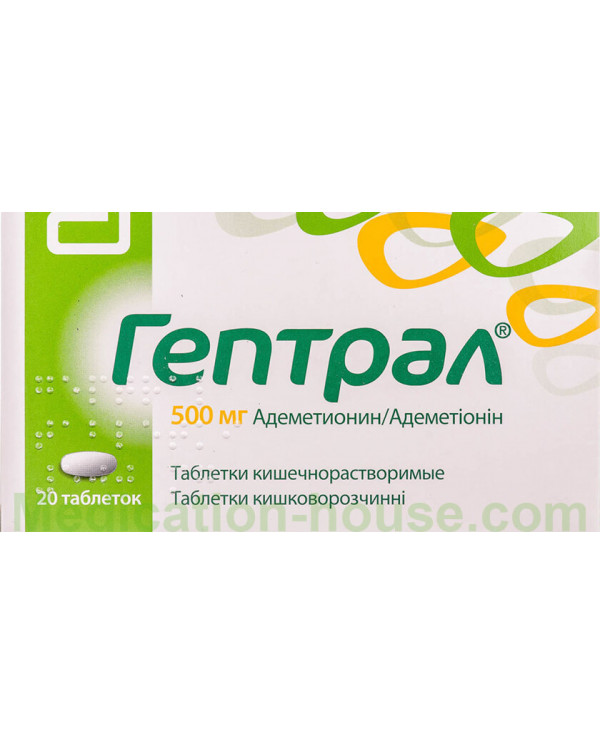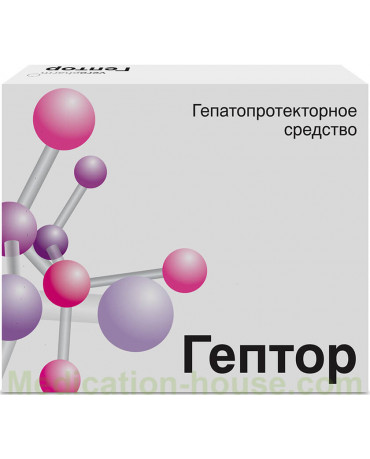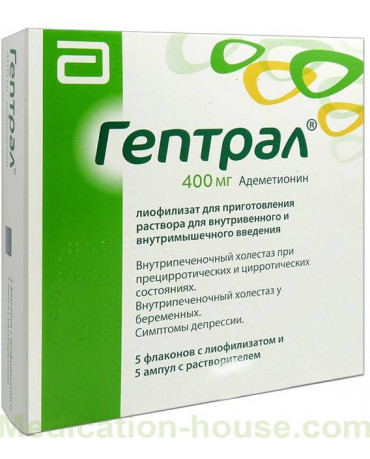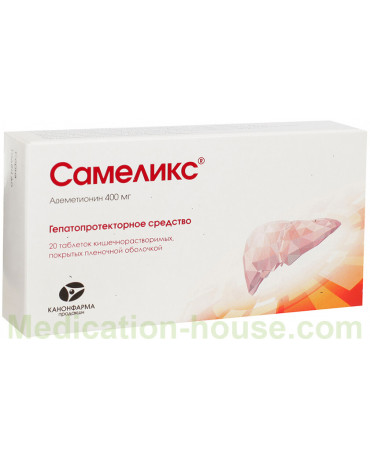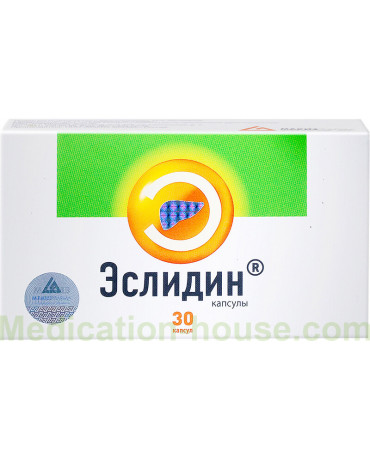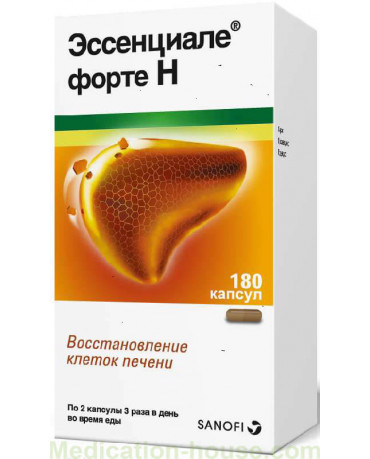Heptral instruction for use
Reed more and buy Heptral here
Heptral is able to suspend the process of destruction and neutralization of various toxic substances, helps restore cells, slows down the oxidation process.
The medication eliminates the deficiency of ademetionine, which is the main active component of Heptral, promotes its production by the body, takes part in methylation and the sulfation reaction, increases the amount of glutamine in the liver and aliphatic sulfur-containing amino acids and sulfonic acids in blood plasma, and restores the liver. The medication is a choleretic whose action is aimed at increasing the concentration of bile acids in bile.
Heptral has been successfully used to treat a clinical syndrome characterized by impaired formation, secretion and excretion of bile components. The medication is prescribed to patients for the treatment of a large number of liver diseases of various origins, for example, fibrosis and cirrhosis of the liver, fatty hepatosis, destruction of the parenchyma, inflammatory processes in the liver, chronic hepatitis, inflammation of the bile ducts due to infection, and the medication is also effective in fighting depressive states and non-inflammatory diseases of the brain.
Composition and form of release
Heptral medication is available in the form of tablets that have a soluble shell, they can be white or yellow in color, have an oval shape. Heptral is sold in packs of 10. The composition of the drug includes the following components: • ademethionine; • polysorb; • magnesium stearic acid; • MCC; • Carboxymethyl cellulose.
Shell components: • copolymers of ethyl ester of acrylic acid; • isobutene acid; • polyethylene glycol 6000; • talc; • twin 80; • simethicone; • caustic soda; • purified water.
Indications for use
Heptral is prescribed by the attending physician for the following health problems: • reduction of bile flow and its entry into the duodenum with fibrosis and cirrhosis of the liver; • steatosis; • inflammation and necrosis of the hepatic parenchyma; • intoxication of the liver of any origin; • chronic inflammation of the gallbladder; • inflammation of the bile ducts due to infection in them; • cirrhosis; • non-inflammatory diseases of the brain; • a decrease in the flow of bile and its entry into the duodenum during gestation; • depressive disorders.
Side effects
The use of the Heptral medication can cause side effects from various vital systems of the patient’s body: • digestive system: nausea, abdominal pain, loose stools, vomiting, dry mouth, damage to the mucous membrane of the esophagus of an inflammatory nature, digestive upset, bloating, pain in the stomach and intestines, gastrointestinal bleeding, the appearance of acute pain in the area of the gallbladder; • nervous system: blurred consciousness, sleep disturbances, vestibular disorders, headaches, sensory disturbance; • musculoskeletal system: joint pain, sudden and involuntary contractions of one or more muscles; • urinary system: infectious diseases; • skin: excessive sweating of the whole body, itching, rashes on the skin; • general reactions of the body: reaction at the injection site, flushing, inflammation of the veins, weakness, painful sensation of cold, flu symptoms, lethargy, swelling, overheating of the body; • allergy: anaphylaxis, angioedema, throat edema.
Contraindications
Patients are not recommended to take the medication if the following factors are present: • a hereditary disease characterized by impaired methionine metabolism; • high content of homocysteine in blood plasma; • lack of vitamin B 12 or problems with its metabolism; • hypersensitivity to the components of the drug; • children under 18 years of age.
Pregnancy
Do not take Heptral in the first and second trimester of pregnancy, as this can affect the development of the fetus. In the third trimester, medication can be taken as usual. During the use of the medication, one should refrain from breast-feeding a baby.
Method and application features
Heptral is prescribed by the attending physician after examining the patient, taking into account the individual characteristics of the body, collecting tests and establishing the clinical picture of the disease. The dosage and duration of the course of therapy is selected individually. Instructions for use contain information on general recommendations for the use of the medication. The medication is taken orally or used for injection intramuscularly or intravenously. The recommended daily dosage for internal use is from 800 to 1600 mg. The recommended daily dosage for injection is from 400 to 800 mg. Elderly patients are prescribed a reduced initial dosage, since such patients suffer from a weakened immune system, renal, hepatic and cardiac disorders of varying severity. When prescribing a dosage, the doctor is suitable with extreme caution, given the presence of other diseases in the patient, as well as taking other medications. If a patient of any age has kidney diseases, mental disorders, while heptral therapy is used with third-generation antidepressants intended for the treatment of anxiety disorders and depression, tricyclics, medicines that contain tryptophan, the doctor should prescribe medication with extreme caution and only under control . If there is a lack of cyanocobalamin and vitamin B9 in the body, there may be a risk of less absorption of the drug Heptral, therefore, vitamins should be prescribed in addition to the medication. In case of depressive disorders, the attending physician should keep the patient under regular supervision so that heptral treatment has the desired effect on the patient. For liver diseases and cirrhosis, the attending physician needs to monitor the nitrogen content in the blood serum, you also need to monitor the level of urea and creatinine. The use of the drug Heptral can cause vestibular disorders, so you should refrain from driving vehicles during drug therapy.
Interaction with other medicines
When using the heptral medication with the tricyclic antidepressant clomipramine, serotonin intoxication may occur in a number of patients. Under the supervision of the attending physician and with extreme caution, a medication should be taken together with: • third-generation antidepressants intended for the treatment of anxiety disorders and depression; • tricyclics (psychotropic drugs used primarily for the treatment of depression); • medicines containing aromatic alpha-amino acid Tryptophan (a proteinogenic amino acid that is part of the proteins of all known living organisms).
Overdose
There are no data on cases of drug overdose, therefore, in the event of any side signs and unpleasant symptoms, it is necessary to inform the attending physician who will find out the cause of the additional health problems and decide to cancel the drug or replace it with another drug.
Storage conditions
The medication should be stored in a place isolated from any source and reach by children at a temperature of 15 to 25 ° C. The shelf life of the drug is 3 years from the date of manufacture. After the expiration date, the medication can not be used, and it must be disposed of in accordance with sanitary standards. The remaining rules and regulations on the use and storage of the medication contains instructions.
Terms of sell
You can buy Heptral without a prescription.

